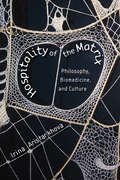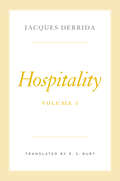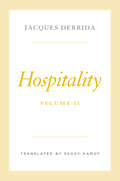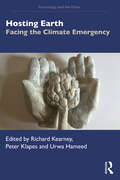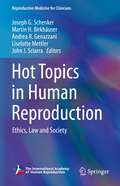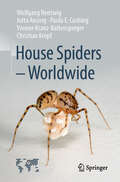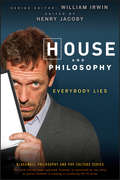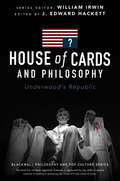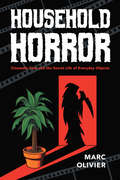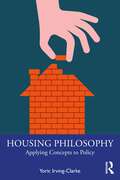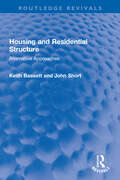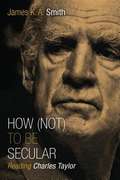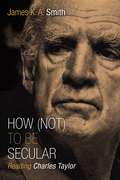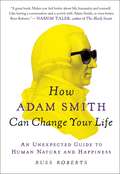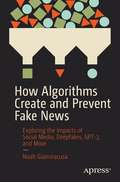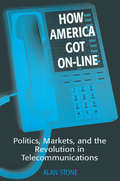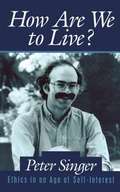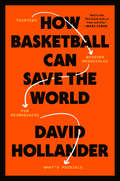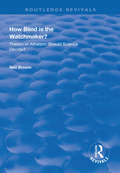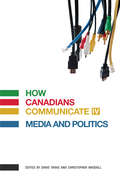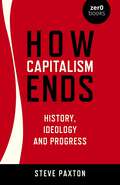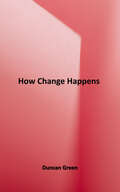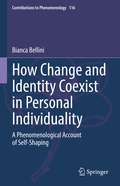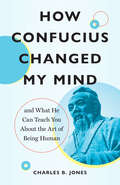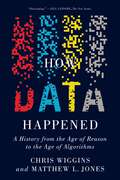- Table View
- List View
Hospitality of the Matrix: Philosophy, Biomedicine, and Culture
by Irina AristarkhovaThe question "Where do we come from?" has fascinated philosophers, scientists, and artists for generations. This book reorients the question of the matrix as a place where everything comes from (chora, womb, incubator) by recasting it in terms of acts of "matrixial/maternal hospitality" producing space and matter of and for the other. Irina Aristarkhova theorizes such hospitality with the potential to go beyond tolerance in understanding self/other relations. Building on and critically evaluating a wide range of historical and contemporary scholarship, she applies this theoretical framework to the science, technology, and art of ectogenesis (artificial womb, neonatal incubators, and other types of generation outside of the maternal body) and proves the question "Can the machine nurse?" is critical when approaching and understanding the functional capacities and failures of incubating technologies, such as artificial placenta. Aristarkhova concludes with the science and art of male pregnancy, positioning the condition as a question of the hospitable man and newly defined fatherhood and its challenge to the conception of masculinity as unable to welcome the other.
Hospitality, Volume I (The Seminars of Jacques Derrida)
by Jacques DerridaJacques Derrida explores the ramifications of what we owe to others. Hospitality reproduces a two-year seminar series delivered by Jacques Derrida at the École des hautes études en sciences sociales in Paris between 1995 and 1997. In these lectures, Derrida asks a series of related questions about responsibility and “the foreigner”: How do we welcome or turn away the foreigner? What does the idea of the foreigner reveal about kinship and the state, particularly in relation to friendship, citizenship, migration, asylum, assimilation, and xenophobia? Derrida approaches these questions through readings of several classical texts as well as modern texts by Heidegger, Arendt, Camus, and others. Central to his project is a rigorous distinction between conventional, finite hospitality, with its many conditions, and the aspirational idea of hospitality as something offered unconditionally to the stranger. This volume collects the first year of the seminar.
Hospitality, Volume II (The Seminars of Jacques Derrida)
by Jacques DerridaJacques Derrida explores the ramifications of what we owe to others. Hospitality reproduces a two-year seminar series delivered by Jacques Derrida at the École des hautes études en sciences sociales in Paris between 1995 and 1997. In these lectures, Derrida asks a series of related questions about responsibility and “the foreigner”: How do we welcome or turn away the foreigner? What does the idea of the foreigner reveal about kinship and the state, particularly in relation to friendship, citizenship, migration, asylum, assimilation, and xenophobia? Central to his project is a rigorous distinction between conventional, finite hospitality, with its many conditions, and the aspirational idea of hospitality as something offered unconditionally to the stranger. This volume collects the second year of the seminar, which considers an Islamic problematic of hospitality, the relevance of forgiveness, and the work of Emmanuel Levinas.
Hosting Earth: Facing the Climate Emergency (Psychology and the Other)
by Richard Kearney Peter Klapes Urwa HameedHosting Earth is a timely and much-needed volume in the emerging literature of environmental philosophy, drawing upon art, science, and politics to explore alternatives to the traditional domination of nature by humans.Featuring a dialogue with Mary Robinson (former UN High Commissioner for Human Rights and former President of Ireland), which addresses the current climate emergency, this book engages the question of ecological hospitality: what does it mean to be guests of the earth as well as hosts? It includes chapters by cutting-edge scholars in the philosophy of nature, as well as artists, scientists, psychologists, and theologians. The contributors discuss proposals for a new "Poetics of the Earth," opening horizons beyond our perilous Anthropocene to a new Symbiocene of mutual collaboration between human and non-human species.Focusing on the central role that the human psyche plays in answering our current ecological emergency, Hosting Earth is for anybody invested in the future of our planet and how psychological, psychoanalytic, and philosophical thought can reorient the current conversation about ecology.
Hot Topics in Human Reproduction: Ethics, Law and Society (Reproductive Medicine for Clinicians #3)
by Andrea R. Genazzani Liselotte Mettler Joseph G. Schenker John J. Sciarra Martin H. BirkhaeuserThis new volume in the Reproductive Medicine for Clinicians series of the International Academy of Human Reproduction (IAHR) focuses on current hot topics in the field, their ethical and legal aspects and their impact on society.It covers topics such as Covid-19, religious and philosophical controversies, possibilities that new technologies offer, human reproductive cloning problems, future challenges related to the heritable gene editing, therapeutic use of stem cells and stem cell factors and the role of receptors in steroids hormone action.This volume also offers an analysis of important innovations and new possibilities such as the use of artificial intelligence in reproductive medicine and the future of prenatal testing. The volume also discusses the issues of pregnancies in advanced paternal age, ethical and legal aspects of gametes donation, sex preselection, surrogate motherhood and infertility in overweight or obese PCOS patients. Chapters on the ethical and legal aspects of fertility preservation in woman, in children with cancer, and in patients sparing treatments in gynecological oncology are also included. This new volume in the series is a valuable resource for gynecologists, obstetricians, endocrinologists, general practitioners and all specialists dealing with reproductive health.
House Spiders - Worldwide
by Wolfgang Nentwig Jutta Ansorg Christian Kropf Yvonne Kranz-Baltensperger Paula E. CushingTo avoid any misunderstandings: this book is not about spiders as pets, but about those spiders that live in our houses and apartments as lodgers. Mostly ignored and sometimes (wrongly) feared, there is hardly a building in the world that does not harbour some species of spider. What is fascinating is that we always find the same species. These spiders must have special adaptations, because the humidity in our homes is far too low, they are too clean, and the food supply is usually scarce. However, those spiders that have made the leap into our four walls are rewarded with a worldwide right to stay. This, in turn, is due to people's eagerness to trade and migrate worldwide: Humans tirelessly transport their belongings and an endless stream of goods around the world in sacks, parcels and containers. And our domestic spiders, as stowaways, travel just as tirelessly and unrecognized. It is therefore possible to present domestic spiders found throughout the world in a single book, as they are essentially the same everywhere. The 50 or so most important species and species groups are presented here in a generally understandable way, with a detailed profile, photos and distribution maps. The authors of this book are experts who work at museums, universities and in administration in Europe and North America. They are not only recognized scientists, but have also been avowed spider fans for decades.
House and Philosophy: Everybody Lies (The Blackwell Philosophy and Pop Culture Series #3)
by Henry JacobyAn unauthorized look at the philosophical issues raised by one of today's most popular television shows: House House is one of the top three television dramas on the air, pulling in more than 19 million viewers for each episode. This latest book in the popular Blackwell Philosophy and Pop Culture series takes a deeper look at the characters and issues raised in this Emmy Award-winning medical drama, offering entertaining answers to the fascinating ethical questions viewers have about Dr. Gregory House and his medical team. Henry Jacoby (Goldsboro, NC) teaches philosophy at East Carolina University. He has published articles primarily on the philosophy of mind and was a contributor to South Park and Philosophy (978-1-4051-6160-2).
House of Cards and Philosophy
by J. Edward HackettIs Democracy overrated? Does power corrupt? Or do corrupt people seek power? Do corporate puppet masters pull politicians' strings? Why does Frank talk to the camera? Can politics deliver on the promise of justice? House of Cards depicts our worst fears about politics today. Love him or loathe him, Frank Underwood has charted an inimitable course through Washington politics. He and his cohorts depict the darkest dealings within the gleaming halls of our most revered political institutions. These 24 original essays examine key philosophical issues behind the critically-acclaimed series--questions of truth, justice, equality, opportunity, and privilege. The amoral machinations of Underwood, the ultimate anti-hero, serve as an ideal backdrop for a discussion of the political theories of philosophers as diverse as Plato, Aristotle, Nietzsche, Machiavelli, Hobbes, and Marx. From political and corporate ethics, race relations, and ruthless paragmatism to mass media collusion and sexual politics, these essays tackle a range of issues important not only to the series but to our understanding of society today.
Household Horror: Cinematic Fear and the Secret Life of Everyday Objects (The\year's Work: Studies In Fan Culture And Cultural Theory Ser.)
by Marc OlivierA scholar examines 14 everyday objects featured in horror films and how they manifest their power and speak to society’s fears.Take a tour of the house where a microwave killed a gremlin, a typewriter made Jack a dull boy, a sewing machine fashioned Carrie’s prom dress, and houseplants might kill you while you sleep. In Household Horror, Marc Olivier highlights the wonder, fear, and terrifying dimension of objects in horror cinema. Inspired by object-oriented ontology and the nonhuman turn in philosophy, Olivier places objects in film on par with humans, arguing, for example, that a sleeper sofa is as much the star of Sisters as Margot Kidder, that The Exorcist is about a possessed bed, and that Rosemary’s Baby is a conflict between herbal shakes and prenatal vitamins. Household Horror reinvigorates horror film criticism by investigating the unfathomable being of objects as seemingly benign as remotes, radiators, refrigerators, and dining tables. Olivier questions what Hitchcock’s Psycho tells us about shower curtains. What can we learn from Freddie Krueger’s greatest accomplice, the mattress? Room by room, Olivier considers the dark side of fourteen household objects to demonstrate how the objects in these films manifest their own power and connect with specific cultural fears and concerns.“Provides a lively and highly original contribution to horror studies. As a work on cinema, it introduces the reader to films that may be less well-known to casual fans and scholars; more conspicuously, it returns to horror staples, gleefully reanimating works that one might otherwise assume had been critically “done to death” (Psycho, The Exorcist, The Shining).” —Allan Cameron, University of Auckland
Housing Philosophy: Applying Concepts to Policy
by Yoric Irving-ClarkeThis book addresses key issues in housing policy through the lens of the philosophical concepts that underpin them. It is intended to be an introduction to philosophical subjects and how they relate to key housing issues and deals with the concepts with enough rigour and depth to be of use to undergraduate and postgraduate students and teachers. Both practitioners in the housing sector and academics researching housing-related subjects often use terms such as ‘fairness’, ‘social justice’, ‘tenure’, ‘property’, ‘home’ and others as if there is a single agreed meaning for these terms. But these terms can be highly contested and there are multiple viewpoints for each of them that could change how we approach them, and how we therefore create, interpret and implement policies and procedures. This book aims to introduce certain concepts and provide guidance and stimulate thinking around how they make an impact on real-world policy. Each section opens with a relevant case study designed to highlight the philosophical concepts to be discussed and coverage ranges from homelessness to the role of government and the state, to house prices, value and property rights. This book will be of interest to students at both undergraduate and postgraduate levels, studying housing qualifications or philosophy, sociology, politics, governance and social policy – it will be of particular use for those interested in the application of philosophical concepts to a real-world policy area with clear consequences.
Housing and Residential Structure: Alternative Approaches (Routledge Revivals)
by John Short Keith BassettFirst published in 1980, Housing and Residential Structure was written to take stock of the many changes that had recently taken place in explanatory approaches to housing markets and residential structure. The book is divided into three parts. Part One focuses on the demand-orientated approaches of human ecology and neo-classical economics. Part Two discusses the institutional approaches with reference to an analysis of private and public sector housing in Britain, drawing on illustrative material from North America and France to aid the comparative analysis of institutional structures. Part Three is devoted to an evaluation of the Marxist approaches to housing and residential structure from Marx and Engels to Castells and Harvey.
How (Not) To Be Secular: Reading Charles Taylor
by James K. A. SmithWhat does it mean to say we live in a secular world? Charles Taylor's landmark book A Secular Age (2007) provides a monumental history and analysis of what it means for us to live in our post- Christian present - a pluralist world of competing beliefs and growing unbelief. This book by Jamie Smith is a compact field guide to Taylor's genealogy of the secular, making that 900-page work accessible to a wide array of readers. Smith's How (Not) to Be Secular is also, however, a philosophical guidebook for practitioners - a kind of how-to manual that ultimately offers guidance on how to live in a secular age. It's an adventure in self-understanding and a way to get our bearings in postmodernity. Whether one is proclaiming faith to the secularized or is puzzled that there continue to be people of faith in this day and age, this book is a philosophical story meant to help us locate where we are and what's at stake.
How (Not) to Be Secular: Reading Charles Taylor
by James K. SmithHow (Not) to Be Secular is what Jamie Smith calls "your hitchhiker's guide to the present" -- it is both a reading guide to Charles Taylor's monumental work A Secular Age and philosophical guidance on how we might learn to live in our times.Taylor's landmark book A Secular Age (2007) provides a monumental, incisive analysis of what it means to live in the post-Christian present -- a pluralist world of competing beliefs and growing unbelief. Jamie Smith's book is a compact field guide to Taylor's insightful study of the secular, making that very significant but daunting work accessible to a wide array of readers.Even more, though, Smith's How (Not) to Be Secular is a practical philosophical guidebook, a kind of how-to manual on how to live in our secular age. It ultimately offers us an adventure in self-understanding and maps out a way to get our bearings in today's secular culture, no matter who "we" are -- whether believers or skeptics, devout or doubting, self-assured or puzzled and confused. This is a book for any thinking person to chew on.
How Adam Smith Can Change Your Life: An Unexpected Guide to Human Nature and Happiness
by Russ RobertsA forgotten book by one of history's greatest thinkers reveals the surprising connections between happiness, virtue, fame, and fortune.Adam Smith may have become the patron saint of capitalism after he penned his most famous work, The Wealth of Nations. But few people know that when it came to the behavior of individuals--the way we perceive ourselves, the way we treat others, and the decisions we make in pursuit of happiness--the Scottish philosopher had just as much to say. He developed his ideas on human nature in an epic, sprawling work titled The Theory of Moral Sentiments.Most economists have never read it, and for most of his life, Russ Roberts was no exception. But when he finally picked up the book by the founder of his field, he realized he'd stumbled upon what might be the greatest self-help book that almost no one has read.In How Adam Smith Can Change Your Life, Roberts examines Smith's forgotten masterpiece, and finds a treasure trove of timeless, practical wisdom. Smith's insights into human nature are just as relevant today as they were three hundred years ago. What does it take to be truly happy? Should we pursue fame and fortune or the respect of our friends and family? How can we make the world a better place? Smith's unexpected answers, framed within the rich context of current events, literature, history, and pop culture, are at once profound, counterintuitive, and highly entertaining.By reinvigorating Smith's neglected classic, Roberts provides us with an invaluable look at human behavior through the lens of one of history's greatest minds.
How Algorithms Create and Prevent Fake News: Exploring the Impacts of Social Media, Deepfakes, GPT-3, and More
by Noah GiansiracusaFrom deepfakes to GPT-3, deep learning is now powering a new assault on our ability to tell what’s real and what’s not, bringing a whole new algorithmic side to fake news. On the other hand, remarkable methods are being developed to help automate fact-checking and the detection of fake news and doctored media. Success in the modern business world requires you to understand these algorithmic currents, and to recognize the strengths, limits, and impacts of deep learning---especially when it comes to discerning the truth and differentiating fact from fiction. This book tells the stories of this algorithmic battle for the truth and how it impacts individuals and society at large. In doing so, it weaves together the human stories and what’s at stake here, a simplified technical background on how these algorithms work, and an accessible survey of the research literature exploring these various topics. How Algorithms Create and Prevent Fake News is an accessible, broad account of the various ways that data-driven algorithms have been distorting reality and rendering the truth harder to grasp. From news aggregators to Google searches to YouTube recommendations to Facebook news feeds, the way we obtain information today is filtered through the lens of tech giant algorithms. The way data is collected, labelled, and stored has a big impact on the machine learning algorithms that are trained on it, and this is a main source of algorithmic bias – which gets amplified in harmful data feedback loops. Don’t be afraid: with this book you’ll see the remedies and technical solutions that are being applied to oppose these harmful trends. There is hope.What You Will LearnThe ways that data labeling and storage impact machine learning and how feedback loops can occurThe history and inner-workings of YouTube’s recommendation algorithmThe state-of-the-art capabilities of AI-powered text generation (GPT-3) and video synthesis/doctoring (deepfakes) and how these technologies have been used so farThe algorithmic tools available to help with automated fact-checking and truth-detectionWho This Book is ForPeople who don’t have a technical background (in data, computers, etc.) but who would like to learn how algorithms impact society; business leaders who want to know the powers and perils of relying on artificial intelligence. A secondary audience is people with a technical background who want to explore the larger social and societal impact of their work.
How America Got On-line: Politics, Markets, and the Revolution in Telecommunication
by Alan StoneThe telecommunications industry is the fastest growing sector of the US economy. This interdisciplinary study of technopolitical economics traces the industry's evolution from the invention of the telephone to the development of hypercommunications. Primary focus is on AT&T and its rivals.
How Are We to Live?: Ethics in an Age of Self-Interest
by Peter Singerrefutes the idea that humans are by nature selfish; powerful call to live an ethical life.
How Basketball Can Save the World: 13 Guiding Principles for Reimagining What's Possible
by David HollanderA thought-provoking exploration of how basketball—and the values rooted in the game—can solve today&’s most pressing issues, from the professor behind the popular New York University courseNBA and WNBA superstars, Hall of Fame players, coaches, and leading cultural figures have all dropped by New York University Professor David Hollander&’s course &“How Basketball Can Save the World&” course to debate and give insights on how the underlying principles of the game can provide a new blueprint for addressing our diverse challenges and showing what&’s possible beyond the court.Now, in How Basketball Can Save the World, Hollander takes us out of the classroom to present a beautiful new philosophy with contributions by many of his past guests and based on values inherent to basketball, such as inclusion and the balancing of individual success with the needs of the collective. These principles move us beyond conflict and confusion toward a more harmonious and meaningful future:Positionless-ness: In basketball, players aren&’t siloed into just one position or responsibility. In life, we can learn to be more adaptive to the challenges we face by embracing a positionless mindset.Human Alchemy: We talk a lot about team chemistry, but team alchemy means the creation of something totally new—a team far greater than the sum of its parts.Sanctuary: Basketball offers players a critical space to feel safe, free, and expressive. Fostering similar spaces in the real world can encourage people to be their best, happiest, and most productive selves.Transcendence: Basketball is about defying gravity, becoming weightless, and flying higher than anyone ever has before. By seeking out this principle, we can elevate ourselves and those around us to a new plane of experience.Whether you&’re a seasoned veteran of the game or have never set foot on a court, How Basketball Can Save the World will empower you to become more resilient, tolerant, and wise in your relationship with yourself, others, and the world around you.
How Blind is the Watchmaker?: Theism or Atheism: Should Science Decide? (Routledge Revivals)
by Neil BroomFirst published in 1998, this book shows that modern materialistic science - for all its ability to analyse in truly impressive detail the workings of the living world - remains powerless to explain the phenomenon of life itself. Drawing on a variety of examples from experience of the biological world as a practising scientist, the author shows that the qualities of purpose, intentionality and mind suffuse almost every aspect of the living realm, yet these same qualities remain totally unaccounted for by science itself. The author argues that the all too common humanistic dismissal of these crucial components of reality undermines the integrity of science itself and is intellectually perverse. He argues that scientific materialism, despite its enormous influence in shaping today’s high-tech world, actually presents a gross trivialization of the concept of life. Further, while unable of itself to provide ultimate answers to the mystery of life, this science uncovers facts that point beyond these to a transcendent, theistic dimension - or, in the words of the title - to a Watchmaker who, indeed, is not blind.
How Canadians Communicate IV: Media and Politics
by David Taras Christopher WaddellSubstantial changes have occurred in the nature of political discourse over the past thirty years. Once, traditional media dominated the political landscape, but in recent years Facebook, Twitter, blogs and Blackberrys have emerged as important tools and platforms for political campaigns. While the Canadian party system has proved surprisingly resilient, the rhythms of political life are now very different. A never-ending 24-hour news cycle has resulted in a never-ending political campaign. The implications of this new political style and its impact on political discourse are issues vigorously debated in this new volume of How Canadians Communicate, as is the question on every politician’s mind: How can we draw a generation of digital natives into the current political dialogue? With contributions from such diverse figures as Elly Alboim, Richard Davis, Tom Flanagan, David Marshall, and Roger Epp, How Canadians Communicate IV is the most comprehensive review of political communication in Canada in over three decades – one that poses questions fundamental to the quality of public life.
How Capitalism Ends: History, Ideology and Progress
by Steve PaxtonWhile the past 300 years have witnessed immense growth in productive capacity, the &‘logic&’ of capitalist production is now pushing progress in all the wrong directions. We&’ve passed the point where our biggest enemy is material scarcity. Our problems no longer revolve around insufficient production, but iniquitous distribution - and the fact that we&’re fast running out of planet - and these are problems that capitalism cannot solve. Taking in a diverse range of contemporary and historical evidence - from the Putney Debates of 1647 to Modern Monetary Theory, from John Locke to Thomas Piketty, from the Rights of Man to the rise of identity politics How Capitalism Ends navigates a path through current affairs, history, economics and philosophy and sets the scene for the conversation we, as a civilization, urgently need to begin…
How Change Happens
by Duncan GreenSociety is full of would-be 'change agents'-campaigners, government officials, enlightened business people, engaged intellectuals-set on improving public services, reforming laws and regulations, guaranteeing human rights, achieving a fairer deal for those on the sharp end, and greater recognition for any number of issues. Drawing on many first-hand examples and numerous new case studies and interviews with grassroots activists and organizations around the world, as well as Oxfam's unrivaled global experience, this important book answers the question: how does change happen and how can governments, organizations, businesses, leaders, campaigners, employees, and ordinary citizens-make a difference?
How Change and Identity Coexist in Personal Individuality: A Phenomenological Account of Self-Shaping (Contributions to Phenomenology #116)
by Bianca BelliniThis book purports to devise a pattern of the self that accounts for the role that change and identity play in self-shaping. It focuses on the process through which we discover, know and shape ourselves and wonder whether there is a core of our individuality and how we should account for it. The core is described along with its range of possible variations and its constraints. This volume provides arguments on how individual essence – far from being something monolithic – is inherently dynamic.The text delves into the link between change and identity in self-shaping, arguably the fundamental issue of personal individuality. Different theories and standpoints are addressed and scrutinized. Descriptive phenomenology will enter along with Max Scheler’s stance on axiology, as well as the keystones that account for self-shaping. This book appeals to students and researchers working on the implications of phenomenology for self identification and personal individuality.
How Confucius Changed My Mind: And What He Can Teach You about the Art of Being Human
by Charles B. JonesA compelling exploration of humanity, morality, religious practice, and leading a good life based on traditional Confucian thought.In this exploration of humanity, morality, religious practice, and leading a good life based on traditional Confucian thought, you are invited on a path of transformation. The unexpected depths to be found in Confucianism surprised author Charles Jones when he began teaching East Asian religions to undergraduate students thirty years ago. It raised fascinating questions relevant to life today, like what does it mean to be human? To understand the Confucian answers to these questions, Jones familiarizes us with Confucius, his main successors, and the situations to which their writings responded.But this is not another textbook introduction to Chinese religion and thought. Jones is an engaging, inquisitive scholar and thought provocateur whose ideas address problems all of us face throughout our lives. By engaging with the Confucian ideas explored in this book, like rethinking &“human nature&” and uncovering cultural presuppositions previously unnoticed, you might discover new horizons and possibilities for your life that previously you never could have imagined. And you will discover Confucius in an all-new light as a profound shaper of modern thought as much as Aristotle and Lao-tzu—whose revolutionary ideas have the power to change your mind for the better.
How Data Happened: A History from the Age of Reason to the Age of Algorithms
by Matthew L. Jones Chris Wiggins“Fascinating.” —Jill Lepore, The New Yorker A sweeping history of data and its technical, political, and ethical impact on our world. From facial recognition—capable of checking people into flights or identifying undocumented residents—to automated decision systems that inform who gets loans and who receives bail, each of us moves through a world determined by data-empowered algorithms. But these technologies didn’t just appear: they are part of a history that goes back centuries, from the census enshrined in the US Constitution to the birth of eugenics in Victorian Britain to the development of Google search. Expanding on the popular course they created at Columbia University, Chris Wiggins and Matthew L. Jones illuminate the ways in which data has long been used as a tool and a weapon in arguing for what is true, as well as a means of rearranging or defending power. They explore how data was created and curated, as well as how new mathematical and computational techniques developed to contend with that data serve to shape people, ideas, society, military operations, and economies. Although technology and mathematics are at its heart, the story of data ultimately concerns an unstable game among states, corporations, and people. How were new technical and scientific capabilities developed; who supported, advanced, or funded these capabilities or transitions; and how did they change who could do what, from what, and to whom? Wiggins and Jones focus on these questions as they trace data’s historical arc, and look to the future. By understanding the trajectory of data—where it has been and where it might yet go—Wiggins and Jones argue that we can understand how to bend it to ends that we collectively choose, with intentionality and purpose.
